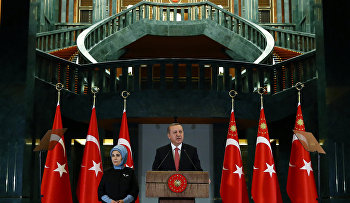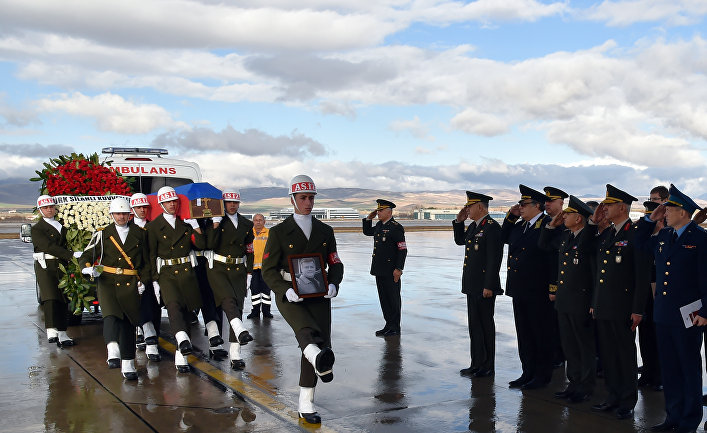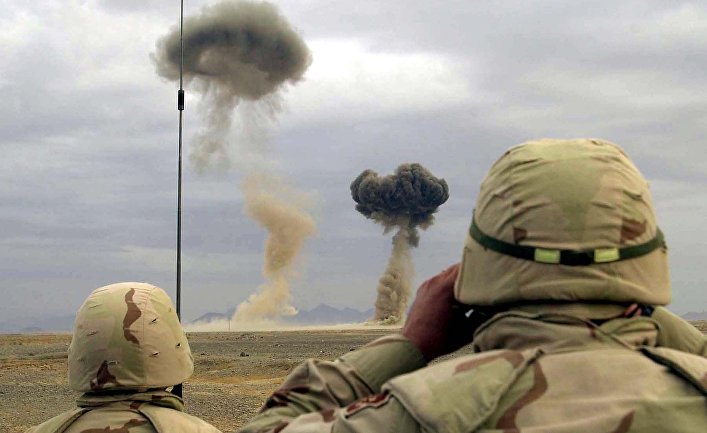The tragic incident in Middle Eastern skies begs many questions — and threatens to pull the legs from under the status quo. What was in Ankara's mind, when they fired rockets at the Russian bomber?
Reasons and lessons
Very probably Turkey hoped for tougher responses from its NATO partners to Russia's attempts to prop-up the army and the regime of President Assad. Ankara had been trying to win the support of EU and NATO nations — and met the EU half-way by agreeing to find ways to staunch the flow of Europe-headed Middle-East migrants routing through Turkey. The sole trump card in Turkey's hand when collaborating with western partners remains its network of checkpoints on the Turkish-Syrian border – whose complete closure was sought after Francois Hollande's meeting with US President Obama, held on 24 November.

It was insufferable for the Turkish leadership, which had recently won a mandate in parliamentary elections, to tolerate major military activities from Russia – a distant (from the Turkish viewpoint) northern power, particularly when conducted in Ankara's most dicey regions — in the Kurdish-controlled zones of Syria, Iraq, and within Turkey itself. Turkish tempers similarly fumed over the position of the Crimean Tatars – their self-proclaimed brethren, who allege ill-treatment by the Russian government.
When recent Russian air sorties struck the Syrian Turkmens embattled against President Assad's forces – but who remain unaligned with ISIL – Turkey clearly lost its nerve. Finding no support from the US or other valued allies — and exactly when President Hollande set off to rally a coalition assembled from major western powers with Russia — Turkey decided to lash out.
The resulting incident enables to make several valuable conclusions. The first is that many major regional players in the Middle East do not see Russia's operations as being directed solely at fighting international terrorism. They are simply not open to any logic which says that any critic of Russia's operations must have some degree of sympathy for the terrorists. If Saudi Arabia and the other Arabic Gulf monarchies remain confined to verbal harangues aimed at Moscow — whilst simultaneously holding talks with Moscow — then the most powerful state in the region, NATO-member Turkey, displayed its readiness to take Russia on in a confrontation.
Russia releases 'proof' Turkey is smuggling Isis oil over its border https://t.co/mqAAVxvS6I
— The Independent (@Independent) December 2, 2015
The second conclusion is that many authoritarian leaders with no taste for sharing power and responsibility with opposition parties (Turkey's ruling Justice & Development Party recently regained a majority in the parliament in elections) are ready to commit any kind of risky stunt – if they believe it will make them look tough, and raise their country's world profile.
The third idea is that for some middle-sized, middle-ranking nations it's more important to be an important regional power than try to struggle in a “unipolar world.” We should get used to expecting such powers to put up no less opposition to Russia's operations (especially the deployment of Russian forces in distant regions) than the USA might have advanced.
Downing of Russia’s #Su24 reveals Turkey’s real agenda in war on #ISIS – Assad https://t.co/9JRHgZtMcP pic.twitter.com/tVzyKN71Z6
— RT (@RT_com) December 2, 2015
Finally, Syria and the surrounding region now poses such a fraught situation that any kind of military operation in the area is prone to unpredictable results. It's impossible to predict all the possible gambits, or evaluate the risks they involve – while the cost of errors, or even of unexpected outcomes can be very high indeed.
What next?
Will any military reprisals follow? Currently Turkey's operations are confined to its own national territories, whereas Russia is extended along tense air and sea communications routes. It may be that not only Turkey, but other nations of the broader Middle East region may dislike Russia's free deployment of its air force and rocket-power in close proximity to their borders – whilst simultaneously not viewing ISIL as any kind of threat to the national security.
Most probably we can expect a show of force. Moscow is already tightening the noose around resources in the vicinity of the clash. Russia is upping its military naval force deployment in the area, and has mentioned that it intends bolstering its air defenses. Ankara, of course, will respond in kind, and NATO has confirmed Turkey's right to defend its sovereignty and air-space – whilst stopping short of giving Ankara a mandate against enemy actions stemming from Russia. Washington has already adopted a low profile – saying that the Russian bomber was shot down over Syrian territory, and urging Ankara to prevent any recurrence of such an incident. Turkey, meanwhile, has been chafing at the bit to take action with or without assurances from its NATO allies – and will certainly not bother waiting for the green light from them in the event of a crisis. Russia, though, has stated it has no intentions “to fight with Turkey” through the statements of its FM Sergey Lavrov – but without cooling the ardor of its accusations against the Turkish leadership.
#Turkey-#Russia altercation shows cracks in #NATO policy https://t.co/92kHoitHtp pic.twitter.com/pIDrbzpdaz
— Sputnik (@SputnikInt) December 2, 2015
The chances for any kind of swift de-escalation will primarily hinge on the upcoming talks between Presidents Hollande and Putin in Moscow. The French leader seems certain to inveigh against Moscow's continuing unconditional support for President Assad – and to hold out for a cessation of Russian air sorties alongside the Turkish-Syrian border. Talks aimed at uniting the forces of the disparate anti-ISIL coalition members seem destined to flop at the present stage over disagreements – since each side is actively seeking to prove the justice of its own position.
As in so many cases in history, the proliferation and escalation of a conflict involving so many major global and regional powers can happen quite suddenly, and even in apposition to what the parties actually seek. Each side is aiming for a just-in-case outcome, with no intention of 'losing face' in any kind of verbal slanging-match unless the next step demands the use of force. And if that does happen, then the situation will get beyond anyone's control. Hanging a gun on the wall, and then firing it at some moment, is a risky military strategy which cannot last for long without losses. Every kind of 'regional game' has the potential to blow up unexpectedly into a global maelstrom.







